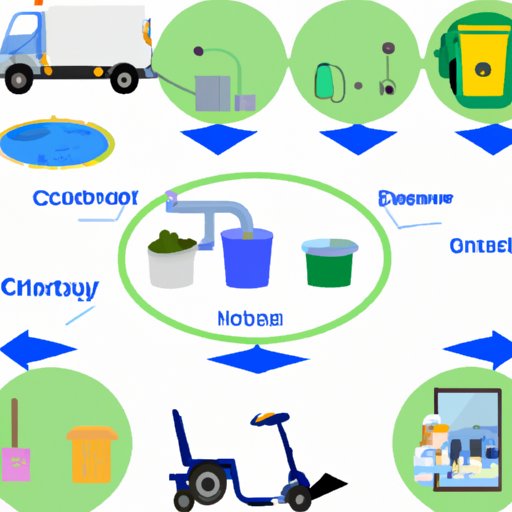Introduction
Sanitation businesses provide an essential service for commercial and residential customers by disposing of their waste in an efficient and safe manner. Starting a sanitation business involves purchasing the necessary equipment, obtaining the necessary licenses and permits, and creating a business plan. Additionally, it is important to create a marketing strategy that will attract potential customers.
Overview of Sanitation Business
A sanitation business provides a service by collecting, transporting, and disposing of solid waste materials. The types of services offered by sanitation businesses vary depending on the type of waste being disposed of. For example, some businesses may specialize in hazardous waste disposal or recycling services. Other services may include emptying portable toilets or septic tanks.
Benefits of Owning a Sanitation Business
Starting a sanitation business can be a lucrative endeavor. The benefits of owning a sanitation business include:
- Flexible schedule–the ability to set your own hours and work when you want
- High demand for services–sanitation services are always in demand, making it easy to find customers
- Potential for growth–as the business grows, more employees can be hired to help with the workload
- Tax deductions–many of the expenses associated with running a sanitation business can be deducted from taxes

Steps to Starting a Sanitation Business
Starting a sanitation business requires careful planning and preparation. Below are the steps to starting a sanitation business:
Equipment and Supplies Needed
The first step in starting a sanitation business is to purchase the necessary equipment and supplies. This includes garbage trucks, dumpsters, and other waste disposal containers. It is also important to purchase safety gear such as gloves, masks, and protective clothing. In addition, you will need to acquire any necessary permits and licenses.
Licensing and Regulatory Requirements
In order to operate a sanitation business, you must obtain the appropriate business licenses and permits. Depending on the state or county where you are located, you may need to obtain a sanitation permit, a business license, and/or other permits. Additionally, you may need to pass certain health and safety tests in order to operate legally.
Business Plan
Creating a business plan is an essential part of starting any business. This document should outline the goals of the business, provide an analysis of the competition, and include a financial plan. Additionally, the business plan should include a marketing strategy and any other information pertinent to the success of the business.
Marketing a Sanitation Business
Once the business is up and running, it is important to create a marketing strategy to attract potential customers. The following are some tips for marketing a sanitation business:
Identifying Target Market
The first step in developing a marketing plan is to identify the target market. Who are the potential customers for the business? Knowing the demographic of the target market will help to inform the marketing strategy.
Developing a Marketing Plan
Once the target market has been identified, it is important to develop a marketing plan. This plan should outline how the business will reach its target audience. Strategies may include advertising in local newspapers, direct mail campaigns, or utilizing social media platforms.
Utilizing Online Platforms
In today’s digital age, utilizing online platforms can be a powerful tool for marketing a sanitation business. Creating a website and utilizing search engine optimization (SEO) techniques can help to increase visibility and draw in potential customers. Additionally, utilizing social media platforms such as Facebook, Twitter, and Instagram can help to connect with potential customers.

Examples of Sample Business Plans for Sanitation Businesses
Creating a business plan is an important part of starting a sanitation business. There are many resources available to help entrepreneurs create a successful business plan. Here are some examples of what a sample business plan for a sanitation business might include:
Outlining the Necessary Steps
The business plan should outline the steps necessary to get the business up and running. This includes obtaining the necessary licenses and permits, purchasing the necessary equipment, and developing a marketing strategy.
Identifying the Target Market
The business plan should include an analysis of the target market. This should include identifying the demographic of the target market and outlining strategies for reaching them.
Estimating Start-Up Costs
The business plan should include an estimate of the start-up costs. This should include the cost of purchasing the necessary equipment, obtaining the necessary licenses and permits, and any other expenses associated with getting the business up and running.
Analyzing Competitors
The business plan should analyze the competition. This includes researching other sanitation businesses in the area and determining how the business will differentiate itself from the competition.
Conclusion
Starting a sanitation business can be a great way to make money while providing an important service. It is important to carefully plan and prepare before starting a sanitation business. This includes purchasing the necessary equipment, obtaining the necessary licenses and permits, and creating a business plan. Additionally, it is important to create a marketing strategy that will attract potential customers. By following these steps, entrepreneurs can be successful in starting a sanitation business.
For more information about starting a sanitation business, visit the Small Business Administration’s website or consult with a business consultant. Additionally, there are many resources available online to help entrepreneurs create a successful business plan.
(Note: Is this article not meeting your expectations? Do you have knowledge or insights to share? Unlock new opportunities and expand your reach by joining our authors team. Click Registration to join us and share your expertise with our readers.)
